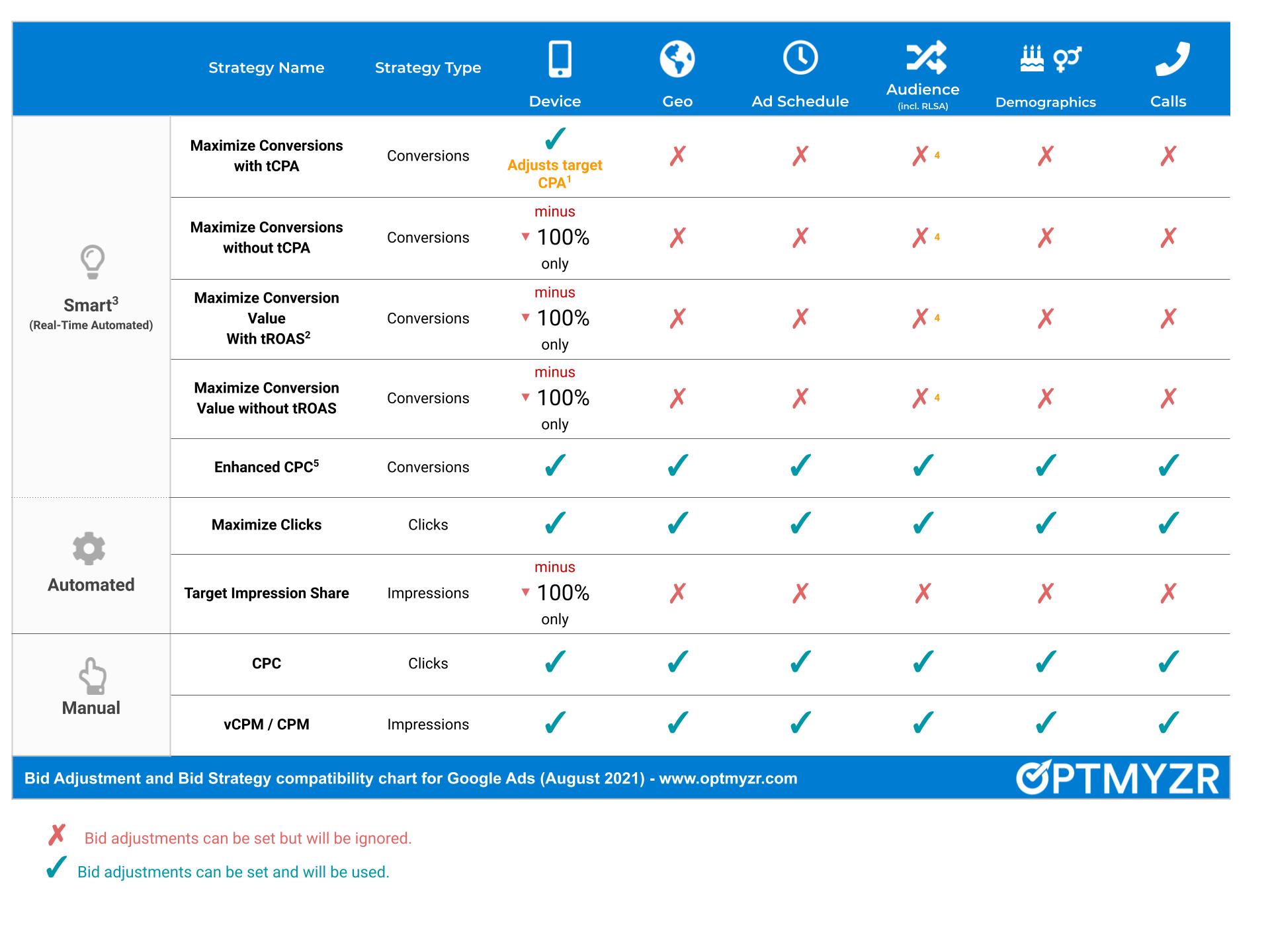Updated*: May 16, 2022*
Google has a tremendous amount of data about how people interact with ads and the computing power and machine learning models to find useful patterns within this.
Combine that with the fact they make bid management available for free to all advertisers and it’s no surprise that their bidding tools are some of the most widely used in the PPC world.
Optmyzr’s tools are the perfect complement for Google’s bid automation, enabling advertisers to monitor and analyze results and to bring their own business data into the mix to further improve results.
For example, Optmyzr can suggest geo bid adjustments while you’re doing smart bidding on Google ads (check out the video below) or use product margin data to enable bidding for profitability, taking things a step further than Google’s target ROAS.
But in working with thousands of advertisers to help take their bid management to the next level, we noticed a fair bit of confusion stemming from the fact that there are 11 types of Google bid strategies that each interact differently with campaign and ad group bid adjustments.
Here’s a fairly common example of why there is confusion: as advertisers transition between bid management strategies, it’s not always obvious which bid adjustments still matter so advertisers with a target ROAS strategy continue to spend time on setting demographic bid adjustments. This is unfortunately a complete waste of time as those bid adjustments are simply ignored by Google.
Advertisers don’t realize they’re wasting time because bid adjustments can be added in the Google Ads interface but depending on the selected bid strategy they may be ignored without warning.
While Optmyzr points out these issues with our Policy and Audit Report, we wanted to help demystify this for all advertisers regardless of whether or not they use Optmyzr so we worked with Google and PPCers on Twitter (shout outs to @BertOnckelinx and @navahf) to create a table of interactions between bid strategies and bid adjustments.
We’ve documented the places in the Google Help Center where our findings came from and tested the settings ourselves. Some of Google’s help materials offer conflicting statements but we’ve done our best to reflect what we see in the real world. Google Ads is constantly evolving so please get in touch with us if you have a suggestion for how to make the table better.

Click here to see a larger version of this image.
Google Help Center References:
1. Unlike bid adjustments for manual CPC, your bid adjustments for Target CPA modify the value of your CPA target, rather than the bids themselves.
2. Because Target ROAS helps optimize your bids based on real-time data, your existing bid adjustments are not used. There is one exception: You can still set mobile bid adjustments of -100%. Note that you don’t need to remove bid adjustments—they just won’t be used.
3. Smart Bidding is a set of conversion-based bid strategies—Target CPA, Target ROAS, and Enhanced CPC (reference) Target CPA, Target ROAS, Maximize Conversions, and Enhanced CPC (ECPC) are all Smart Bidding strategies (reference)
4. Smart Bidding will use your audiences as signals to bid more efficiently and help get you more conversions and conversion value. Bid adjustments work differently when you’ve applied a conversion-based automated bid strategy and the campaign or ad group contains multiple lists with overlapping users. Rather than adjusting your bids, your bid adjustments will instead prioritize the audience list to which an impression, click, etc. will be attributed.
5. ECPC automatically takes into account different conversion rates for all types of traffic but sets bids separately for mobile devices. This means you don’t need to set any bid adjustments (aside from mobile) for ECPC to maximize conversions. However, if you want to bid more aggressively for certain types of traffic you can still choose to set a bid adjustment. This adjustment will be applied on top of ECPC’s automatic adjustments.
6. Google does not recommend setting bid adjustments unless those adjustments are being made for reasons that wouldn’t be captured in the conversions such as LTV.
7. Starting in late June 2019, advertisers will no longer be able to add new Target Search Page Location or Target Outranking Share bid strategies. Later this year, existing campaigns still using these strategies will automatically be migrated to the Target Impression Share strategy based on previous target locations and historical impression share.
Get actionable PPC tips, strategies, and tactics from industry experts to your inbox once a month.









